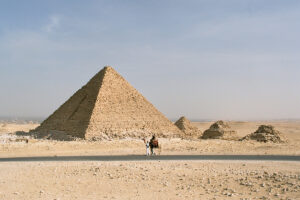
Egypt aborts controversial pyramid renovation plan
CAIRO — Egypt has scuttled a controversial plan to reinstall ancient granite cladding on the pyramid of Menkaure, the smallest of the three great pyramids of Giza, a committee formed by the country’s tourism minister said in a statement.
Mostafa Waziri, secretary general of the Supreme Council of Antiquities, announced the plan last month, declaring it would be “the project of the century.”
But news that the ancient monument might be altered quickly drew an international outcry, prompting Egypt’s antiquities authority to review the project. The pyramids are the only one of the seven wonders of the ancient world that still remain.
Alone among the pyramids, Menkaure was designed to be clad in granite rather than limestone. Only 16 to 18 layers of granite were installed before construction was halted, apparently because of Menkaure’s death in about 2503 B.C.
Over the centuries, pilfering, weathering and collapse caused many layers to disappear, leaving only seven layers in modern times, although numerous fallen granite blocks remain strewn around the pyramid’s base.
Mostafa Waziri said the project to replace the granite would proceed only after a year of scanning and documentation.
“The Menkaure Pyramid Review Committee has unanimously objected to the reinstallation of the granite casing blocks, scattered around the base of the pyramid since thousands of years ago,” the committee said in a statement on Thursday.
Zahi Hawass, a former minister of antiquities who headed the committee, said it would be impossible to determine where each block had originally been. Replacing them would also require cement, which would ruin the pyramid.
“What I want to say is don’t worry, the pyramids of Giza are safe, and nothing will happen to them,” Zahi Hawass told Reuters. “People everywhere are calling me, writing letters, e-mails. They are worried. Don’t be worried at all, the pyramids are safe, and no one can touch the pyramid of Menkaure.”
The seven-member committee gave initial consent to excavate Menkaure pyramid’s boat pits, akin to the Pharaonic bark pits found alongside Khufu’s pyramid adjacent to Menkaure’s, but only after a “clear and detailed scientific study.”
“In archaeology, don’t be in a hurry. If you are in a hurry, you will ruin the site,” Hawass said. “It is important for any kind of work to be done at the site of the pyramids, is to make a study and to tell us what to do.” — Reuters



